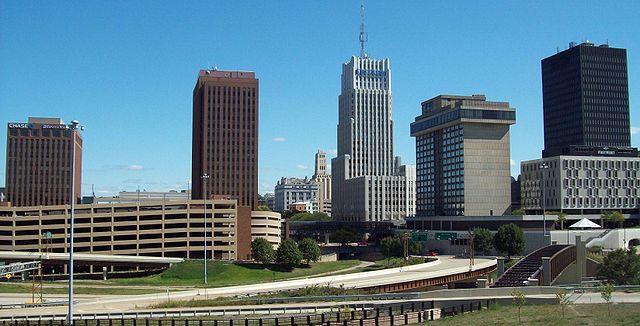
Akron, Ohio. Photo credit: Sleepydre, Public Domain
David Zipper has a good piece up in City Lab that’s focused on urban tech startups but makes a bigger and more important point: the problems of superstar cities are not the problems of most cities.
If you live in a place like San Francisco or New York where urban tech startups (and, ahem, national media) are concentrated, these conflicts seem to be reshaping cities throughout the country. But if you dig a little deeper, it’s clear that’s hardly the case. With fewer than twenty new homes built in a city of 200,000 last year, Akron recently abated property taxes for new housing as a way to prop up the construction market. Many of Akron’s leaders would love to have the problem of excessive housing demand that Airbnb has allegedly created.
And although Uber and Lyft are available in almost all American cities at this point, their use is concentrated in big, dense regions. It’s extremely unlikely that the ride-hailing industry’s piece of the mobility pie in a place like Topeka or Louisville comes close to the 20% of vehicle miles seen in San Francisco.
In fact, urban tech innovations—as well as the narrative surrounding the field—disproportionately focus on a handful of cities that are already winning the competition for mobile workers and tourists. Urban tech’s relevance and impact are much more limited in the many mid-sized cities that are spread across the country. Why is that?
Well, for one thing, urban tech startups are often launched by the well-educated young people clustered in thriving “unicorn cities” like New York, Boston, San Francisco, and Austin. They also happen to be the places where venture capital firms concentrate, ready to finance growth (such firms tend to fund startups near their headquarters to keep a close eye on investments and minimize travel).
The same handful of cities dominates the urban discussion even though their problems are highly atypical. The profile of people designing tech solutions are likewise atypical, often young singles living in dense urban environments. No surprise the high profile apps are ones that call taxis (Uber), order food (Seamless), get your laundry done (Fly Cleaners), find a date or hookup (Tinder), and so on.
Zipper is in the tech business so he focuses on tech. But the same extends to much of the rest of the policy toolkit. Affordable housing is not really an issue in most of the country, for example. Yet many of these cities are focusing on affordable housing because it’s getting so much media attention. Louisville, for example, seems to have some sort of an affordable housing set aside program for new development, similar to superstar cities.
He highlights, I think, one of the downsides of a superstar concentrated system of media, tech, etc. It creates a media and solution focus that is only applicable to a limited number of places.
Because America is so diverse, places need to be careful not to get sucked into this vortex, but to think about their own problems and their own context. It will likely be that not just the solutions, but even the problems they should be focused on are very different from what’s on the agenda in San Francisco and Washington.
from Aaron M. Renn
http://www.urbanophile.com/2017/10/02/their-problems-are-not-your-problems/
No comments:
Post a Comment